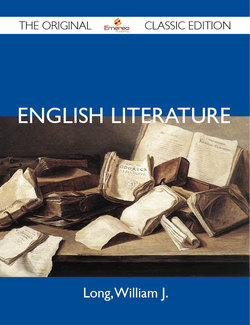Описание книги
This is a high quality book of the original classic edition. <p> This is a freshly published edition of this culturally important work, which is now, at last, again available to you. <p> Enjoy this classic work. These few paragraphs distill the contents and give you a quick look inside: <p>
We have laid emphasis upon the delights of literature; we have treated books not as mere instruments of research–which is the danger in most of our studies–but rather as instruments of enjoyment and of inspiration; and by making our study as attractive as possible we have sought to encourage the student to read widely for himself, to choose the best books, and to form his own judgment about what our first Anglo-Saxon writers called the things worthy to be remembered.
<p>....In reading many text-books of late, and in visiting many class rooms, the writer has received the impression that we lay too much stress on second-hand criticism, passed down from book to book; and we set our pupils to searching for figures of speech and elements of style, as if the great books of the world were subject to chemical analysis.
<p>....In studying each successive period, let the student begin by reading the best that the age produced; let him feel in his own way the power and mystery of Beowulf, the broad charity of Shakespeare, the sublimity of Milton, the romantic enthusiasm of Scott; and then, when his own taste is pleased and satisfied, a new one will arise,–to know something about the author, the times in which he lived, and finally of criticism, which, in its simplicity, is the discovery that the men and women of other ages were very much like ourselves, loving as we love, bearing the same burdens, and following the same ideals:
<p>....All art is the expression of life in forms of truth and beauty; or rather, it is the reflection of some truth and beauty which are in the world, but which remain unnoticed until brought to our attention by some sensitive human soul, just as the delicate curves of the shell reflect sounds and harmonies too faint to be otherwise noticed.
<p>....Its object, aside from the delight it gives us, is to know man, that is, the soul of man rather than his actions; and since it preserves to the race the ideals upon which all our civilization is founded, it is one of the most important and delightful subjects that can occupy the human mind.
We have laid emphasis upon the delights of literature; we have treated books not as mere instruments of research–which is the danger in most of our studies–but rather as instruments of enjoyment and of inspiration; and by making our study as attractive as possible we have sought to encourage the student to read widely for himself, to choose the best books, and to form his own judgment about what our first Anglo-Saxon writers called the things worthy to be remembered.
<p>....In reading many text-books of late, and in visiting many class rooms, the writer has received the impression that we lay too much stress on second-hand criticism, passed down from book to book; and we set our pupils to searching for figures of speech and elements of style, as if the great books of the world were subject to chemical analysis.
<p>....In studying each successive period, let the student begin by reading the best that the age produced; let him feel in his own way the power and mystery of Beowulf, the broad charity of Shakespeare, the sublimity of Milton, the romantic enthusiasm of Scott; and then, when his own taste is pleased and satisfied, a new one will arise,–to know something about the author, the times in which he lived, and finally of criticism, which, in its simplicity, is the discovery that the men and women of other ages were very much like ourselves, loving as we love, bearing the same burdens, and following the same ideals:
<p>....All art is the expression of life in forms of truth and beauty; or rather, it is the reflection of some truth and beauty which are in the world, but which remain unnoticed until brought to our attention by some sensitive human soul, just as the delicate curves of the shell reflect sounds and harmonies too faint to be otherwise noticed.
<p>....Its object, aside from the delight it gives us, is to know man, that is, the soul of man rather than his actions; and since it preserves to the race the ideals upon which all our civilization is founded, it is one of the most important and delightful subjects that can occupy the human mind.
